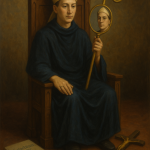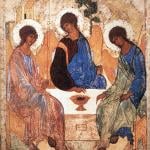THE MAN IN THE HIGH CASTLE: I just finished this novel, in which the Axis powers win WWII. It takes a very long time to figure out what’s up here. For a while it just feels like, Yeah, this is an interesting psychological picture of how Americans would have reacted if we’d lost, but what else you got?
It doesn’t feel that way once you finish it. My first thought, on slowly closing the book, was whether TMITHC would be read long after its political context had entirely lost resonance, solely for its metaphysical intuitions. I wondered if future generations would read TMITHC pretty much the way I read The Man Without a Country–I honestly don’t care about the patriotism angle; what I noticed was the angle of exile from a beloved country.
This thought made me realize that TMITHC used the conventions of alternate-history in something similar to the way that Hamlet uses the conventions of the revenge tragedy. What if the tricks and tropes weren’t just there to make the plot-gears grind? What if they had real metaphysical weight? What if you wrote an Axis-wins novel not because it was creepy, but because it said something about God-haunted man?
I don’t think that’s necessarily what Philip Dick wanted to do with TMITHC. From what I can tell from the novel and the limited amount of “secondary material” (= people bubbitzing about the novel) that I’ve read, Dick is writing from a Taoist stance that I don’t share.
Which maybe makes it all the more powerful that I found so much in TMITHC that resonated with the way I see the world. I think in the end, Dick is saying a lot of things (and I’m trying hard here not to spoil), including:
1. This world is a shadow of something else. One of the fundamental moments of insight is the moment when we realize that this is not what was meant to be–that there is something else, something real and true (“Inner Truth”), where at least some of this world’s evils never happened. Where human actions and choices took place in a gentler context.
2. Art is one way of gaining access to that world, the real world of which our own experience is only a shadow. True art–not “ideal” art, not art that separates itself from humans and human needs and human realities (like the Nazi art Lotze praises in the novel), but art that somehow connects human loves to an outside reality–moves human perceptions closer to understanding the world as it ought to be–the world as it, in some important sense, really is. (It’s somehow important that the world where the Nazis lost is not fake, is not imagined, is not abstract–it’s somehow important that the world where the greater horror lost is real.) Dick’s novel manages to make the case for art as spur to healing without falling into the lame, facile Richard Rorty trap of claiming that novels make you nice. Perhaps that’s because in Dick’s novel, art makes the characters act rightly toward one another because art offers some kind of entry into the world as it should be–the world as it is, not the shadow-world of cruelty and horror.
3. Entering into the “real world,” the world as it is, does not make the characters reject the denizens of the world of shadows. They don’t selfishly retreat into their visions of the salvaged world. Instead, it’s their experience of the salvaged world that prompts them to take anti-Nazi actions in the world they know.
4. The novel is deeply realistic. A final cocktail party is so familiar that I had to laugh. The emotions of a subordinate people come through clearly. The hallucinatory interludes come in places where I believed real people would break free from their ordinary experiences of the world. This psychological realism helps cement one of the themes of the novel: Art connects human experience and individual lovingkindness to an outside, “other” reality; and it is by this other reality that we judge our own actions to be better or worse.
5. The characters don’t necessarily recognize that the “real world” (= the world you and I know, where the Axis lost) is preferable to their own world, where Africa is a heap of bones and North America is a collection of occupied territories. I’m trying hard not to spoil, but it’s part of the novel’s exceptional achievement that I completely believed a) that one character had experienced a vision of our world; b) that in that world, the character had been subordinate, rather than dominant as he’d been in the Axis-ruled world; and c) that this vision nevertheless prompted one of the central humane acts of the novel.
So yeah. One of the things I’m thinking about a lot, right now, is how personalism recognizes the essentially lacking, seeking nature of the human person. Liberalism appeals to the seek-y-ness (sorry) of our souls–the sense that we need to find our own harbor, that simply forcing us to dock somewhere will not suffice. And conservatism appeals to our incarnate being, our historicity, the fact that we as seekers always begin somewhere. We always have a language and a tradition; and yet that language and tradition are always inadequate, and, in most cases, already present humans as exiles, somehow cast out, somehow broken before we even began. The mythic Golden Age is always already past. I think that personalism is a way to understand why liberalism happened, and what it gets right; and why conservatism asserts itself in response, and what it gets right; and why neither one of these philosophies genuinely satisfies the human heart. And The Man in the High Castle understands all of that, I think–which makes it hopeful, and human, and great.
Your thoughts, as always, welcome. For lit-crit obsessives, I note that I came up with my docking/anchorless metaphors above before I remembered that San Francisco is a harbor.











